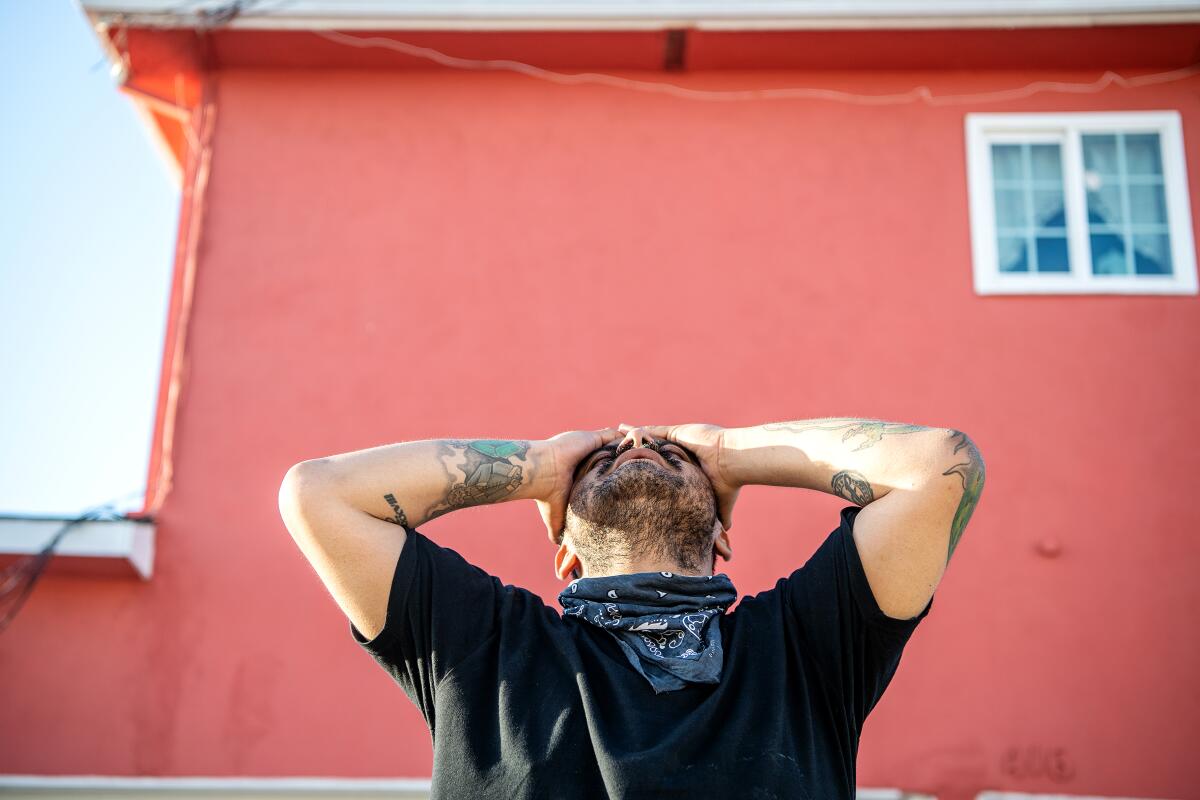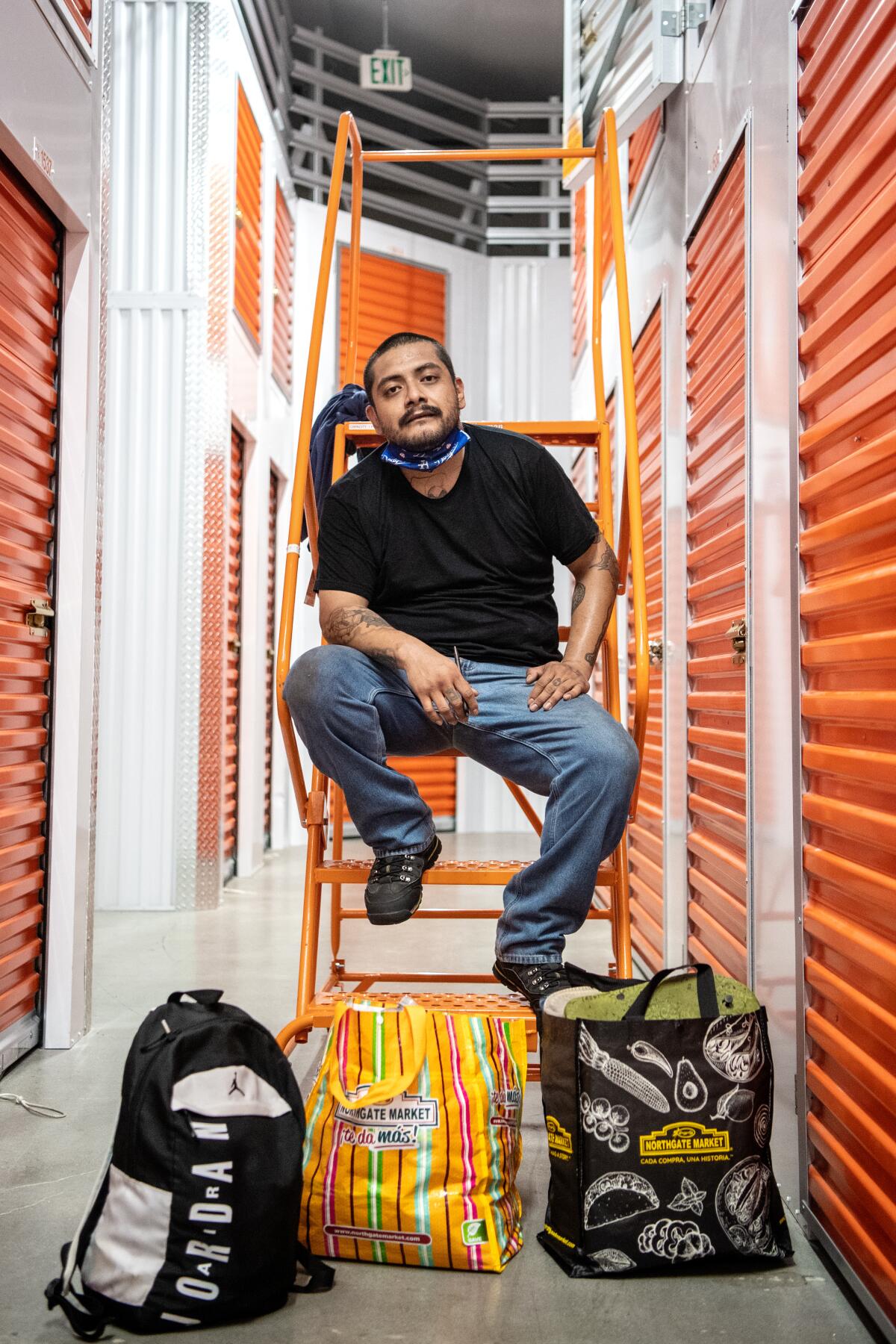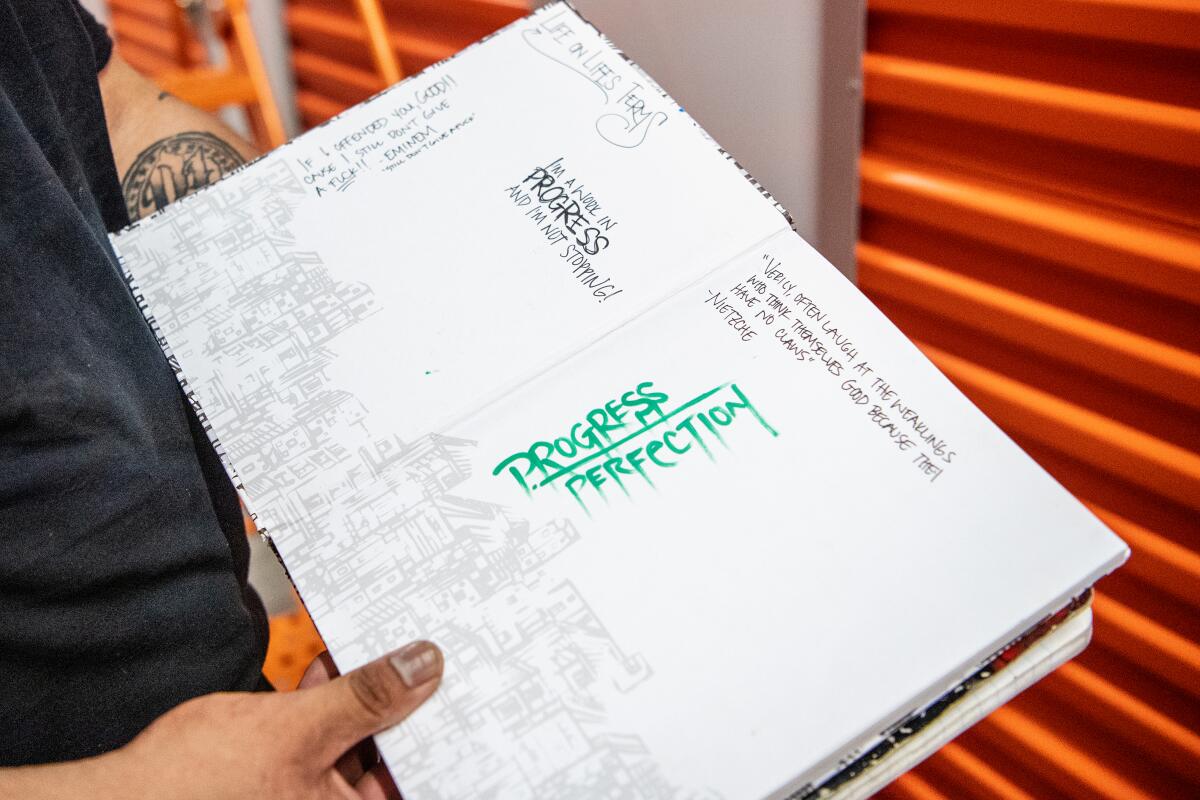The undocumented restaurant workers who fed us are being forgotten. This is their struggle

Tony Ruiz doesn’t know where he’s going to sleep tonight.
Two months ago, the 31-year-old had a steady job as a line cook at the San Francisco Saloon, the long-standing bar and grill on Pico Boulevard, and was renting a room in a home near the West L.A. neighborhood where he grew up. When he wasn’t working, he dreamed of someday opening his own restaurant.
Now, with his job lost to the coronavirus outbreak and his savings eroded, Ruiz is in crisis mode.
He got evicted from the home he was living in last week over a dispute involving missed rent (Ruiz moved out but says he’s looking for legal aid to fight the eviction). Most of his personal belongings were recently locked up in storage. He’s spent the past several nights drifting between friends’ houses, sleeping on couches, scanning Craigslist job boards daily for work and trying not to fall into despair.
Ruiz has no access to unemployment benefits, or federal, state or city emergency relief funds, because he is undocumented.
His parents brought him to the U.S. from Oaxaca, Mexico, when he was a year old. Every attempt to get a permanent resident card over the years has failed, he said.
“It feels like I’m fighting for my life with my hands tied behind my back,” he said, describing his life during the age of coronavirus.

The American restaurant industry hinges on the labor of undocumented workers like Ruiz. The Pew Research Center estimates that about 10% of the industry workforce, or more than a million U.S. restaurant workers, are undocumented; many work in low-pay back-of-house jobs without worker protections.
The coronavirus crisis has brought into sharp focus the structural disparity of an industry that relies on such workers to make restaurants profitable. Now the workers who have been making restaurants run efficiently — and who contribute millions in payroll and unemployment taxes every year — have been left to fend for themselves.
Oscar, who is undocumented and requested his surname be withheld for privacy, is another restaurant worker reeling from the sudden loss of income.
He was juggling two restaurant jobs before the shutdown. He worked 70 hours a week on average, splitting the hours between a popular downtown cocktail bar and a restaurant-bar in West Hollywood.
The 46-year-old Oaxaca native came to the U.S. two decades ago. He fell into restaurant work and liked the hustle and speed it required. Without papers, it was the best work he could find.
He has washed dishes at Italian restaurants in Beverly Hills, bused tables at a Mexican restaurant near MacArthur Park and worked as a barback and kitchen assistant at a glitzy downtown nightclub.
Restaurant work is energizing, he says, but it can be deeply demoralizing.
“A restaurant worker without papers has to work twice as hard. You have to constantly say: ‘I’ll do it.’ The day someone is out sick, you have to cover. You can’t get sick. You can’t call out. It’s a hard road to walk,” he said.
Oscar has worked for employers who have taken advantage of workers’ status, he said. There was the owner of an Italian restaurant in Beverly Hills who “yelled and threatened” undocumented employees. (“He made men cry,” he said.) Then there were the owners of the Mexican restaurant near MacArthur Park who shuttered the dining room abruptly, leaving the largely undocumented staff without explanation or back pay.

“They just closed up. They went out of business and never paid us,” he said.
His two most recent employers were kinder, but he suspects he made less than many of his coworkers. He felt treated differently too.
“I’ve always made less than my coworkers with papers. You can sense when you are getting paid less than other people. When you work many more hours in a week but your paycheck is smaller,” he said.
“If you stand still for a second, someone always needs something right away. The back-of-house staff is not allowed to take long, chatty paid breaks like the other workers.”
Like many undocumented workers, Oscar files his taxes every year using an Individual Taxpayer Identification Number.
It’s the right thing to do, he said, and he hopes someday it helps him gain permanent resident status.
He regrets paying his taxes early this year.
“I did my taxes a few weeks before the pandemic reached us and I was hit with a $1,000 tax bill. If I had known, I wouldn’t have filed,” he said.
“It seems unjust that I’m charged taxes, but when I need help, there is none,” he said.
“There is despair in not knowing what’s going to happen and watching your money disappear. Nobody can help. There’s no solution in sight. Maybe for people with papers there’s hope. But for somebody without papers, there is no light at the end of the tunnel — only darkness,” he said.
For Ruiz, the shutdown has opened up old wounds related to his complicated bicultural identity and place in the world.
“I only know my home state of Oaxaca through pictures and TV shows and documentaries. I feel ashamed not to know more about my own people,” he said.
“But I went to kindergarten, elementary school, to high school on the Westside. I know more about football than soccer. I bleed blue for the damn Dodgers, you know?”
He was drawn to restaurant work in part by the work of Anthony Bourdain, who once described the professional kitchen as “a place for people for whom something in their lives has gone terribly wrong.”
“It’s just a bunch of miscreants, criminals and pirates that work in the kitchen,” Ruiz said with a laugh.
“Some of the people I’ve met there have become family. They see you at your worst and they see you at your best.”
Ruiz has been surviving with help from the friends he’s made working in restaurants, including his former coworker Damian Diaz, who now runs the Boyle Heights-based bar consulting group Va’La Hospitality alongside business partners Aaron Melendrez and Othón Nolasco.
Diaz, Melendrez and Nolasco recently launched No Us Without You, an effort to feed undocumented restaurant workers.
“When COVID-19 struck, we saw a lot of GoFundMes and charity drives pop up, but most of these were geared toward front-of-the-house workers. But undocumented workers are the backbone of this industry, whether you hate to admit it or not,” Diaz said.
“And they are the most at risk right now for health issues and hunger.”
On April 15, Gov. Gavin Newsom approved $125 million in funds to undocumented immigrants in California affected by the coronavirus pandemic and excluded from the $2.2 trillion federal CARES Act. The proposal has met resistance from conservative groups. The emergency aid, which is partially funded by nonprofit organizations, is expected to offer one-time $500 cash grants for individuals and $1,000 for families.
A one-time payment is an important but largely symbolic gesture to the state’s undocumented workforce, a vital part of the California economy. The state has about 2 million undocumented workers — nearly 1 out of every 10 California workers, according to the Public Policy Institute of California.
No Us Without You, which started by donating 30 emergency food boxes to undocumented restaurant workers, aims to fill gaps in the safety net locally. The group passed out 340 emergency kits this week.
Diaz says the group is committed to feeding workers every week for the foreseeable future.
“The hardest part is seeing the shame on the faces of some of the people who come here to pick up food boxes. It takes a lot to put your pride aside and accept help. Especially the men. Sometimes they’ll stay in the car while their wife comes to get the box,” he said.

Diaz met Tony Ruiz a decade ago when they were both in their early 20s and working at the same Santa Monica restaurant. He describes his friend as hard-working, dogged and kind.
“We bonded over hip-hop and weed,” Diaz said with a laugh.
“He was my first industry friend and we’ve always been there for one another. When he reached out for help, as humbly as he did, it was humbling for me for life to come full circle like that,” said Diaz.
For Ruiz, the COVID-19 crisis has been a vivid reminder of the ways his life has been shaped, and his ambitions warped, by forces beyond his control.
“I was 21 or 22 when I realized I would probably never get to work in a high-end kitchen because most of them use E-Verify and I wouldn’t pass a background check. That’s when I got the first taste of not belonging. That’s when I first realized how serious it was to not have papers,” he said.
“This nightmare has brought back all those feelings.”
Recently, just to see what filing a claim entailed, Ruiz logged onto the California unemployment insurance website.
“The first thing they ask you is for a Social Security number,” he said. “So what do you do when the one you have isn’t yours? Or you had to go down to MacArthur Park to buy it, because it was the only way you could get a job? What do you do then?” he asked, fighting tears.
“Do you just pray that a miracle will happen?”
More to Read
Eat your way across L.A.
Get our weekly Tasting Notes newsletter for reviews, news and more.
You may occasionally receive promotional content from the Los Angeles Times.










